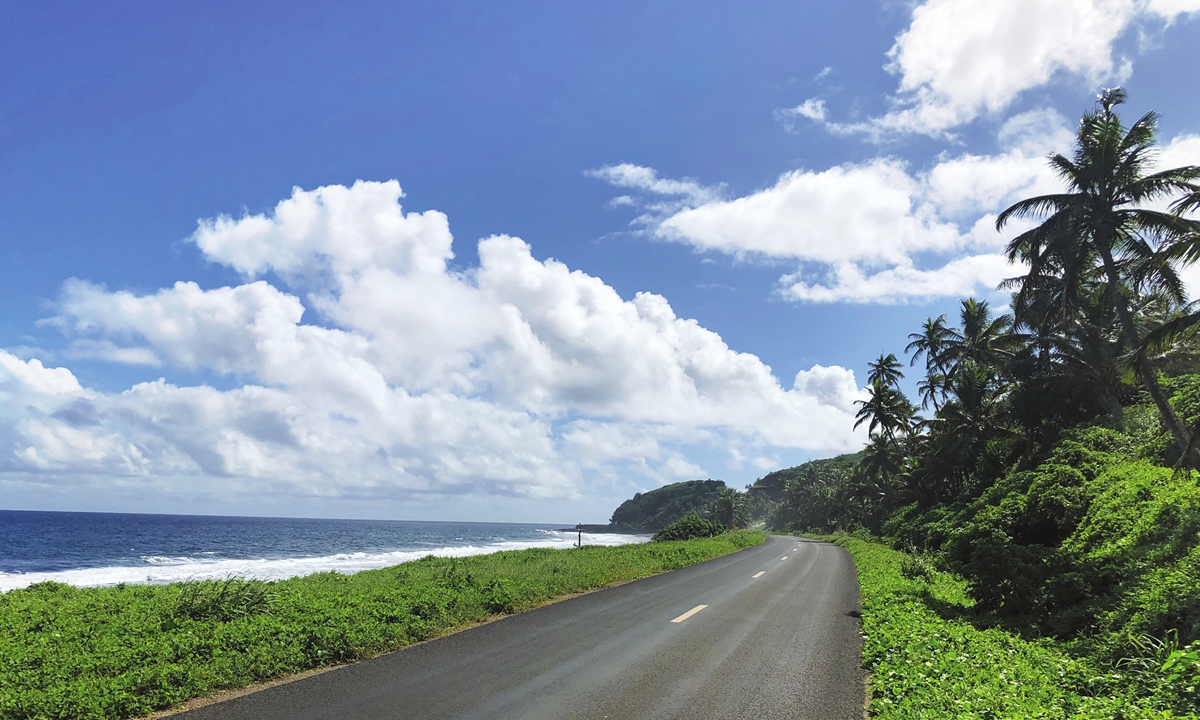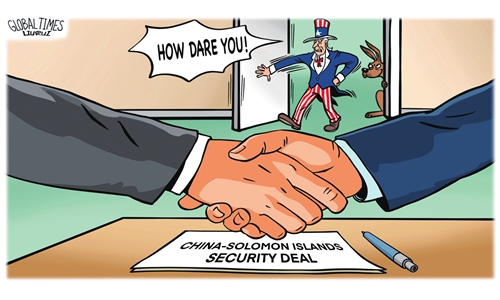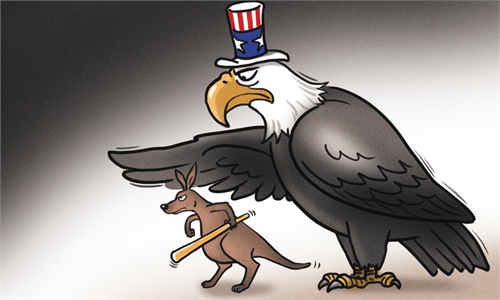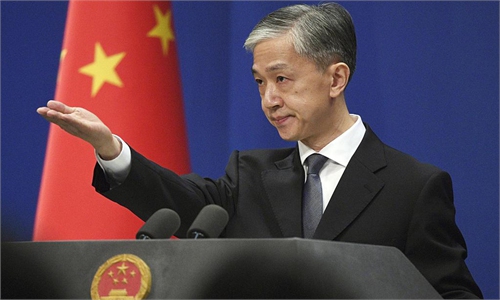BRI projects being carried out as usual in Pacific island nations despite Western smear campaign

View of a road project in Vanuatu built by China Civil Engineering Construction Corporation Photo: Courtesy of CCECC
The US, Australia and their Western allies have long been conspiring a systematic, top-down smear campaign targeting China's Belt and Road Initiative (BRI) projects in the Pacific islands, and these attacks culminated in recent days with the signing of an open, transparent security pact between China and the Solomon Islands- a Pacific nation which the US and Australia treated as their "vassals" under hegemony mindset.
From spreading disinformation via mainstream media and non-government organizations (NGOs) with made-up stories of so-called Chinese military base and clichés of "debt traps," to deliberately erecting barriers to Chinese employees and rejecting Chinese firms' access to West-led multinational financial institutions, US and Australia seem to have used all means in a malicious attempt to obstruct normal commercial relations between China and the Pacific Islands.
Despite the hindrance, BRI projects are being rolled out on schedule across Pacific island nations regardless of Western threats and hysterical attacks, the Global Times learned. After years of absence by the West, and increasing Chinese investment in the Pacific islands, locals and officials have learned to discern the difference between an empty promise and substantial cooperation, and as such, locals are not buying into vicious rhetoric against China anymore, Chinese business representatives told the Global Times.
"There are clear signs that some foundations, NGOs and Western media outlets are colluding with the US and Australian governments, targeting Chinese-invested projects in the Pacific island nations in recent days," an executive from a state-owned enterprise who leads that firm's South Pacific business told the Global Times on the condition of anonymity.
Another manager of a Solomon Islands-based Chinese company, who began business there in 2015, also told the Global Times on condition of anonymity that certain Australian media organizations had travelled to the island nation about two weeks ago, looking to "create some anti-China noises" to disrupt the locals' cooperation with Chinese businesses.
He also confirmed that local branches of certain NGOs in Solomon Islands and certain women's associations were also involved in the campaign to undermine Chinese business.
Organized smearing
Subject to prolonged neglect by the West, the Solomon Islands, with a population of over 600,000, has suddenly become a "favorite" of Australia and the US after it signed a security pact with China - which the West labeled as "a threat", although China and the Solomon Islands have reiterated on many occasions that the cooperation frameworks complies with international laws and practices.
Last week, a high-level US delegation visited the nation to put pressure on it, following a recent visit by an Australian senator. The US Embassy in Solomon Islands has been closed for 29 years. Ambassador Daniel Kritenbrink, assistant secretary of state for East Asian and Pacific Affairs who formed part of the delegation, said US won't rule out military action if China "establishes a base in Solomon Islands," the Guardian reported. Japan also dispatched a senior official to the Solomon Islands on Monday.
Western media slandering against Chinese projects has meanwhile escalated over the last few weeks. The New York Times ran a lengthy article, hyping "how a Chinese security deal in the pacific could ripple through the world." The Australian Broadcasting Corporation also claimed in a report in early April that Beijing's interests in the Pacific Islands are geopolitically-driven, as it looks to "create partnerships to extend its security apparatus globally."
Some Western media also sought to attack a laundry list of China-invested BRI projects, including a suspended port project in Samoa, distorting how these projects created "debt trap" for the local economies.
"Disruptions to BRI projects in the South Pacific are not new. Australian officials have not stopped badmouthing Chinese projects for many years, and the consultants sent by Western nations also seek to distance local governments from Chinese projects," the anonymous executive said, adding that it is also extremely difficult for Chinese employees with an official passport to secure an Australia transit visa, when often the fastest and most convenient way for them to fly back is to transit through Sydney.
According to the executive, a block on Chinese firms is also rampant in international financial institutions, some of which have denied Chinese firms 'participation in projects they launched in Pacific islands for reasons that "do not stand ground."
Normal cooperation
Chen Canyan, president of China Agricultural &Trade Development of Fiji, told the Global Times that it is "ironic to see swarms of" high-level Western official visits to the Solomon Islands - an island nation that they had long since forgotten - in recent weeks, immediately after the security pact was signed.
"It seems like if any country wants to attract attention from the West, it should not beg them but instead building closer ties with China at first," Chen said. He pointed out that the unrelenting slander against Chinese projects exposes the hegemony deeply rooted in the philosophy of the West, under which they "ideologicalized and politicized" China's normal economic exchanges with these countries, and to treat the Pacific islands, which they had long perceived as their "backyard," as a new field of competition for swaying geopolitical influence.
"US and Australia have sought to intimidate Pacific Islands nations with their claimed 'China threat' theory, and after that failed, they began hyping so-called 'debt trap.' But the reality is: who is the biggest source of instability for the region and who brought benefits?" Yu Lei, chief research fellow at the research center for Pacific island countries of Liaocheng University in East China's Shandong Province, told the Global Times.
To strengthen their military presence in the region, the US and Australia has been speeding up building naval and air military bases in the South Pacific, according to media reports. In 2021, Australia, along with the US, reportedly committed $175 million to upgrade the Lombrum naval base on Manus Island, in Papua New Guinea.
Chinese businessmen said that China's win-win cooperation with Solomon Islands will also set an example for other Pacific island nations, and could foster closer economic ties after the cooperation yields tangible benefits.
"It is natural for Pacific islands to build closer economic relations with China, as the world's second-largest economy is home to a complete industrial chain, which complements the industrial structure of Pacific islands," one businessman said.
In 2019, the Solomon Islands joined the China-proposed BRI, after establishing diplomatic relations with China. To date, about 10 Pacific Island nations have signed up to the BRI.
"After being disappointed by developed nations, there has been a strategy of 'looking north' among Pacific nations, which equates to developing closer economic relations with Asia, including China, leveraging the region's capital, technology and modernization experience to fuel growth," Chen said.
Yu explained that the infrastructure connectivity under the BRI will aid Pacific Island nations to be connected both "internally" and "externally," integrating them into the global economic system.
On April 22, China handed over a training track and football field venue that will be used for the 2023 Pacific Games in the Solomon Islands. The China-funded training track, constructed by China Civil Engineering Construction Corporation (CCECC), is the Solomon Islands' first international standard modern track, with the entire project due to be delivered by April 2023.
CCECC also helped in constructing a road project connecting two islands in Vanuatu, a spokesperson told the Global Times.



